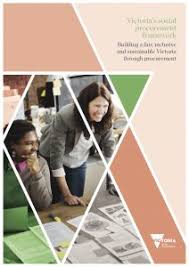The final topic in this series exploring the hottest sustainable cleaning trends for 2019 is social sustainability. Covering diverse issues from human rights through to wellbeing, this is probably one of the most complex issues that cleaning companies and suppliers have to grapple with today.
Fair labour practices, decent living conditions, health and wellbeing, diversity and equity, quality of life, philanthropy and volunteerism, can all fall under the umbrella of social sustainability. Trying to keep up with the latest areas of concern can result in a folder of policies, or documents that are forever tweaked and never finalised.
Several years ago I helped a company write their Corporate Social Responsibility policy, only to be asked to rewrite it a month later to match a different set of tender requirements! No, that’s not a policy, that’s a sales document.
How do you develop policies that will enable you to comply with your customer’s latest social sustainability benchmarks and regulations, while building a lasting culture of social responsibility within your own organisation?
You start with a Corporate Social Responsibility Policy, then link it to procedures for meeting social sustainability initiatives and laws, such as Social Procurement and the Modern Slavery Act.

1. Corporate Social Responsibility
‘Corporate Social Responsibility’ (CSR) is your stated intention to put processes into place to evaluate and minimise the negative impact that running your business may have on people and the planet.
The concept that businesses had a ‘social responsibility’ originated in the sixties. But it was not until the late nineties, that an accounting framework called the Triple Bottom Line enabled corporations to make decisions that measured their environmental and social performance alongside their financial performance.
For several decades, globalisation had been able to keep dirty secrets of social and environmental disasters because they happened in faraway places. But public awareness of the devastation caused by major oil spills, deforestation, sweat shops, and malpractices such as the 2013 Dhaka garment factory collapse, is growing.
Motivated by the risk of reputational damage, and consumer, employee and shareholder demand for greater corporate accountability, CSR policies with Triple Bottom Line reporting became the norm. This expectation was passed up their supply chain to providers of products and services.
An early criticism of CSR was that it was too vague and prone to spin. Each company decided which issues to be responsible for and how to address them. Fortunately there are now regulations and voluntary standards that address many social sustainability issues, providing a much-needed level of guidance and compliance.
A CSR policy is still highly relevant. It provides your company with an overarching framework for declaring your intention to comply with regulations and measuring your triple bottom line. It should identify risks and responsibilities toward your staff, your customers, the wider community, and those working in your own supply chain.
And finally, it should describe how your procurement, employment and operational procedures and strategies must achieve these aims. For example:
- Sustainable Procurement: to purchase products and materials that are certified by eco-labels that set standards for minimal environmental impact, and require evidence to support claims that materials are sustainably and ethically harvested and produced.
- Wellbeing: to implement methods that improve indoor air quality and reduce surface contamination, for the wellbeing of building users.
- Charities: to support those that improve the environmental and social living conditions of vulnerable people.

2. Social Procurement
Covering issues such as inclusivity and fair labour practices, Social Procurement relates to your own staff when you are the supplier of services or products, and to the staff engaged in providing the products and services you purchase.
The Victorian Government has released an excellent Social Procurement Framework that covers:
- Purchasing from social enterprises
- Purchasing from Aboriginal businesses
- Purchasing from Australian Disability Enterprises
- Suppliers that provide inclusive opportunities
This Framework requires government providers to demonstrate outcomes for: anti-discrimination, anti-bullying, equal pay, job opportunities for people with disabilities and disadvantages and purchasing from social and indigenous enterprises.
Managing and reporting on your compliance with industrial laws, or demonstrating your commitment to providing fair and inclusive working conditions, is not difficult. Here are some strategies to consider:
- Externally auditing of the procedures in your Quality Management System.
- Using software that tracks the labour hours delivered and wages paid.
- Providing training and equipment to ensure cleaners can complete duties in the given time.
- Asking suppliers for evidence of their initiatives to prevent exploitation in their supply chain.
- Post positive stories and photos on your website or newsletters of your social procurement policy in action.
- Support charities and community programs and engage your staff in their events.

3. Modern Slavery Act
You’re may think that slavery is not something we have to worry about in Australia, but Modern Slavery is a global human rights issue. The risk of forced labour is in your supply chain, not just your own company.
The Australian Government enacted the Modern Slavery Act in January 2019, with reporting requirements for companies that turn over more than $100million per annum, or $50million in NSW.
While your company may not operate in this league, your clients may well do. According to the Financial Review, Dexus, Vicinity and Mirvac are three REIT (real estate investment trust) operators taking the biggest steps to identify their supply chain risks.
With a migrant, part-time workforce, working after-hours across multiple buildings, cleaners are at high risk of casual exploitation by rogue managers unless there are effective policies and systems in place to prevent it.
Proving that your company has a low risk profile is now a requirement for many corporate, institutional and government employers. There are several ways to do this:
- Prepare and submit a Voluntary Statement of Compliance to the Modern Slavery Act through your operations and supply chain to the Home Affairs Office.
- Directly employ your labour force and use management and payroll software that enables you to report on wages and super payments as required.
- Fully disclose your sub-contractors if you use them and ensure they meet your own strict policies.
- Have a Sustainable Procurement Policy to only purchase products and materials that are certified by eco-labels that set labour and fair trade standards.
This year (2020) the Cleaning Accountability Framework (CAF) will launch a Contractor Prequalification Certification scheme. This scheme will evaluate a company’s policies and systems for their capacity to prevent the risk of non-compliance to the Fair Work Act and the Modern Slavery Act.
Social Sustainability reminds us that a healthy and sustainable environment is a social justice issue, and that a ‘clean’ cleaning company is an essential part of maintaining a clean building.

